Last updated on November 14th, 2024 at 07:25 am
The little, oval-shaped seeds of the fennel plant (Foeniculum vulgare) have a characteristic, sweet flavor that is slightly licorice-like. Fennel seeds are the dried fruit of the fennel plant. This spice is prized for its many health advantages in addition to its distinctive flavor and is used extensively in many different cuisines worldwide. Fennel seeds can be added whole or minced and used to improve the flavor of many different foods, both savory and sweet.
Given all of its health benefits, fennel seeds have gained a lot of attention in the health community, especially for improving digestion and general well-being. It’s easy to include fennel seeds in your diet by using them in your favorite recipes or indulging in a calming cup of fennel tea.
What Are Fennel Seeds?
The fennel plant, which is native to the Mediterranean region but is currently grown throughout much of the world, yields fennel seeds. The plant produces seeds from its blooms, which are distinguished by their ridged surface and greenish-brown hue. Their flavor, which is sweet and anise-like, can improve the flavor of a lot of foods. Indian, Middle Eastern and Mediterranean cuisines frequently incorporate fennel seeds.
Apart from its culinary application, fennel seeds are occasionally mistaken for anise seeds, a separate spice with a comparable flavor profile. Fennel seeds are more nuanced in flavor and have a little sweeter taste than other seeds.
The Indian Name for Fennel Seeds is Saunf
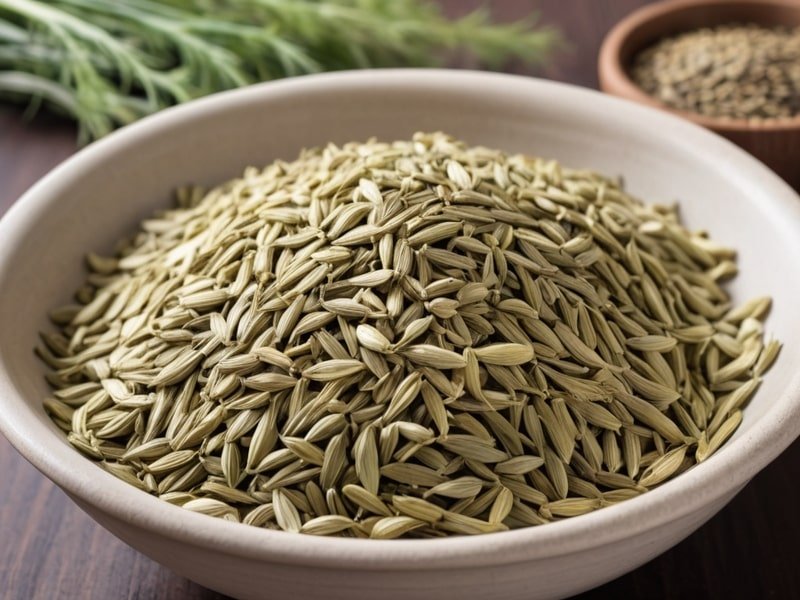
Fennel seeds, sometimes referred to as saunf in India, are used extensively in both traditional Indian medicine and cooking. Many people use saunf as a flavor enhancer, digestive aid, and mouth refresher. with many Indian homes and restaurants, serving roasted or sugar-coated saunf after a meal is usual to aid with digestion and leave a delicious aftertaste.
In addition, saunf is a staple in many Indian spice mixes, such as garam masala and panch phoron, and it provides flavor to chutneys, pickles, and curries. Saunf is valued greatly in Ayurvedic medicine for its calming qualities and for balancing the body’s heat and digestive energy. Saunf is a common ingredient in Indian homes because of its many culinary and health advantages, regardless of whether it is consumed raw, toasted, or steeped into tea.
Another common application for saunf is in Indian desserts and drinks. For instance, saunf is an essential component of meethi saunf sharbat, a cool and delicious beverage made with water, sugar, and fennel seeds. This beverage is especially well-liked in the summer because it helps with digestion and beats the heat.
Culinary Uses of Fennel Seeds
Fennel seeds are quite adaptable and can be prepared in a number of ways in the kitchen.
- Spice Blends: Fennel seeds play a significant role in a variety of spice mixtures, including Chinese five-spice powder and garam masala. Their sugary taste counteracts the spiciness of spices like black pepper and chili powder.
- Savory Recipes: Marinates, stews, and soups are excellent uses for these seeds. They can improve the flavor of meats like chicken and pig as well as roast veggies.
- Baking: You may also use fennel seeds in baking. For a novel taste variation, add them to bread, cookies, or muffins.
- Drinks: Fennel seeds are used in various cultures to add flavor to teas and other beverages. Famous for its calming qualities, fennel tea is commonly drunk after meals to facilitate digestion.
- Pickling: To give pickled vegetables their sweet flavor, fennel seeds can also be used in pickling brines.
Health Benefits of Fennel Seeds
Fennel seeds have several culinary applications in addition to their health advantages.
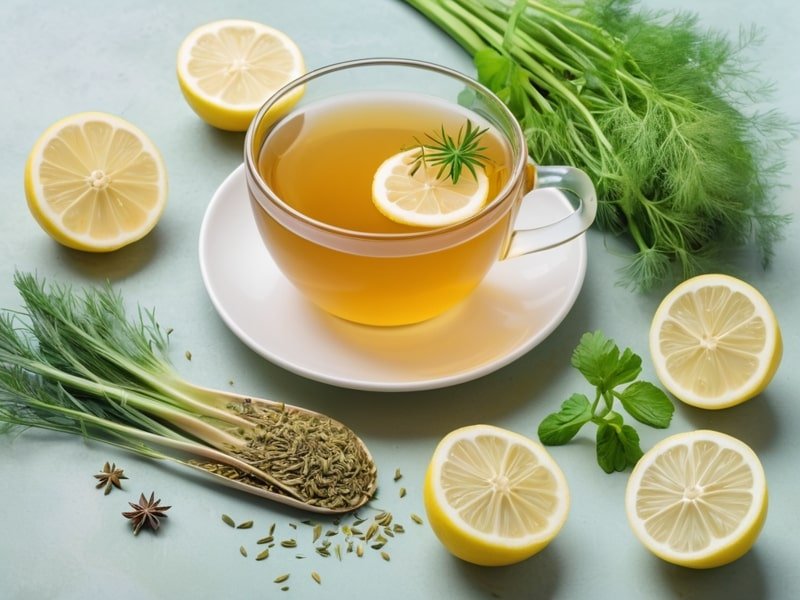
- Digestive Aid: It’s well known that fennel seeds can reduce gas and bloating. They aid in improving digestion by inducing the activity of digestive enzymes.
- Antioxidant Properties: Packed with antioxidants, fennel seeds can lower the risk of chronic diseases by assisting the body in battling oxidative stress.
- Hormonal Balance: Phytoestrogens found in fennel seeds may assist women’s hormone balance and relieve menopausal and menstrual problems.
- Anti-Inflammatory Effects: Fennel seeds have anti-inflammatory qualities that can aid in lowering inflammation in the body and enhancing general health.
- Weight control: Fennel seeds’ high fiber content can make you feel fuller for longer, which may help with weight control.
- Heart Health: Because fennel seeds may help decrease cholesterol and increase blood circulation, they are also good for heart health.
According to WebMD, fennel seeds are a rich source of minerals and antioxidants that promote hormone balance, heart health, and digestion.
Nutrition of Fennel Seeds
Fennel seeds are nutrient-dense in addition to their flavor. Six grams, or one tablespoon, of fennel seeds contains:
- Calories: 20
- Carbohydrates: 3 grams
- Protein: 1 gram
- Fat: 0.9 grams
- Fiber: 2 grams
Vitamins & Minerals:
- Vitamin C: 1% of the Daily Value (DV)
- Calcium: 4% of the DV
- Iron: 2% of the DV
- Magnesium: 4% of the DV
Anethole, an essential oil that has been researched for its anti-inflammatory and anti-cancer qualities, is among the other oils found in fennel seeds that add to their distinct flavor and health advantages.
How to Use Fennel Seeds in Cooking
Fennel seeds are simple to incorporate into food! Here are some pointers on how to include them in your recipes:
- Toast the Seeds: Fennel seeds become more flavorful when they are toasted. Before using them in your recipe, reheat them in a dry skillet over medium heat until fragrant.
- Use Whole or Ground: You can use either whole or ground fennel seeds, depending on your taste. While whole seeds add a wonderful crunch, ground seeds release more flavor.
- Combine with Complementary things: Garlic, onion, tomatoes, and different herbs like rosemary and thyme are some of the things that fennel seeds go well with.
- Add at Various Stages: Fennel seeds can be used for a richer flavor early in the cooking process or for a fresher taste right before serving.
Storing Fennel Seeds
Fennel seeds should be kept in a cool, dark place in an airtight container to preserve their freshness. They can survive up to six months if properly preserved. To keep the remaining fennel seeds fresh for longer, think about portioning them out if you purchase them in bulk.
See some delectable suggestions in this guide on what to serve with jambalaya to balance the strong flavors of this traditional dish for the ideal meal combo.
Fun Fennel Seed Recipes
Here are some delectable recipes that highlight the distinct taste of fennel seeds:
1. Fennel Seed Roasted Chicken
Ingredients:
- 1 whole chicken (about 4 pounds)
- 2 tablespoons fennel seeds, toasted
- 4 cloves garlic, minced
- 1 lemon, halved
- Salt and pepper to taste
- Olive oil
Instructions:
- Turn the oven on to 375°F, or 190°C.
- Combine minced garlic, toasted fennel seeds, salt, and pepper in a bowl. Apply this blend to the entire bird, including the area behind the skin.
- After squeezing the lemon halves, put the chicken within the cavity.
- After sprinkling the chicken with olive oil, roast it for approximately one and a half hours, or until its internal temperature reaches 165°F (75°C).
- Before carving, let it rest and serve with your preferred side dishes.
2. Fennel Seed and Tomato Soup
Ingredients:
- 2 tablespoons fennel seeds, toasted
- one sliced onion
- 4 cloves garlic, minced
- 2 cans diced tomatoes
- 4 cups vegetable broth
- 1 teaspoon sugar
- Salt and pepper to taste
- Fresh basil for garnish
Instructions:
- Add the onion and garlic to a large pot and sauté until transparent.
- Fennel seeds should be added and cooked for a further minute.
- Add sugar, vegetable broth, and diced tomatoes and stir. Add pepper and salt for seasoning.
- After 20 minutes of simmering, mix until smooth.
- Garnish with fresh basil and serve hot.
3. Carrots Pickled with Fennel Seeds
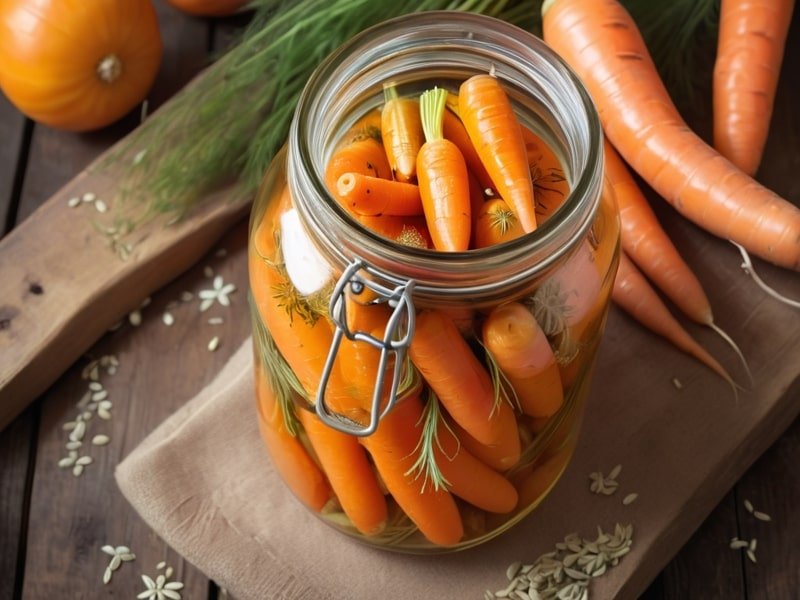
Ingredients:
- 1 pound carrots, cut into sticks
- 1 cup white vinegar
- 1 cup water
- 2 tablespoons sugar
- 1 tablespoon fennel seeds
- Salt to taste
Instructions:
- Put the vinegar, sugar, fennel seeds, water, and salt in a pot. Heat till boiling.
- Sterilize jars and fill them with carrots.
- Cover the carrots with hot pickling liquid, making sure they are completely submerged.
- Before refrigerating, seal the jars and allow them to cool. After a day, they are ready to be consumed.
Traditional Medicine Using Fennel Seeds
Traditional medical systems have historically used fennel seeds, especially Ayurveda and Traditional Chinese Medicine (TCM). They are used to treat a variety of illnesses and are frequently suggested for their advantages to the digestive system.
- Use in Ayurveda: Fennel seeds are thought to help balance the body’s doshas, or energies. They are frequently used to treat indigestion, gas, and discomfort associated with menstruation.
- Traditional Chinese Medicine (TCM): Fennel seeds are used to alleviate digestive problems associated with colds by warming the stomach.
Fennel Seed Tea: A Calm Drink
A calming and fragrant drink that promotes relaxation and helps with digestion is fennel seed tea. Making it at home is simple:
Ingredients:
- 1 teaspoon fennel seeds
- 1 cup boiling water
- Honey (optional)
Instructions:
- To extract the flavor of the fennel seeds, lightly crush them.
- Pour the pulverized seeds into a cup of hot water.
- After ten minutes of steeping, strain.
- If desired, sweeten with honey and savor!
Side Effects of Fennel Seeds
While fennel seeds are typically healthy for most individuals, excessive ingestion might lead to several negative effects:’
- Allergic Reactions: Fennel may cause allergies in certain people. Itching, edema, and rashes are possible symptoms.
- Hormonal Effects: In some people, especially those with hormone-sensitive diseases, fennel seeds may disrupt the hormonal balance because of their phytoestrogen content.
- Digestive Problems: Although fennel seeds can help with digestion, eating too much of them can irritate your stomach or cause diarrhea or nausea.
- Drug Interaction: Fennel seeds have the potential to interact with some drugs, especially those that influence hormone levels. If you are taking medication, you must speak with a medical expert.
Conclusion
Fennel seeds are more than simply a tasty spice; they have many culinary applications and health advantages. Fennel seeds can improve your favorite meals and aid with digestion. They are a great complement to have in your kitchen cupboard. Fennel seeds add a subtle flavor and beautiful texture to baked items, savory foods, and calming drinks.
If you’re interested in learning more about the applications and advantages of fennel seeds, you should look into recipes and health resources.
FAQs About Fennel Seed
1. How can I incorporate fennel seeds into my diet?
Fennel seeds are a versatile ingredient that can be added to soups, stews, baked goods, and spice combinations. They taste as good as tea as well.
2. Are fennel seeds safe during pregnancy?
Pregnant women should speak with their healthcare professional before consuming fennel seeds in larger quantities, as they may trigger uterine contractions, even though they are normally safe to use in food preparation.
3. Can I use fennel seeds in desserts?
Of course! Fennel seeds add a distinctive flavor to a variety of baked items and sweets.
4. What are some common substitutes for fennel seeds?
In case you are lacking fennel seeds, you can replace them with anise seeds or a blend of dill and caraway seeds.
5. Can fennel seeds help with weight loss?
When included in a balanced diet, the fiber in fennel seeds might help you feel fuller for longer, which may help with weight management.

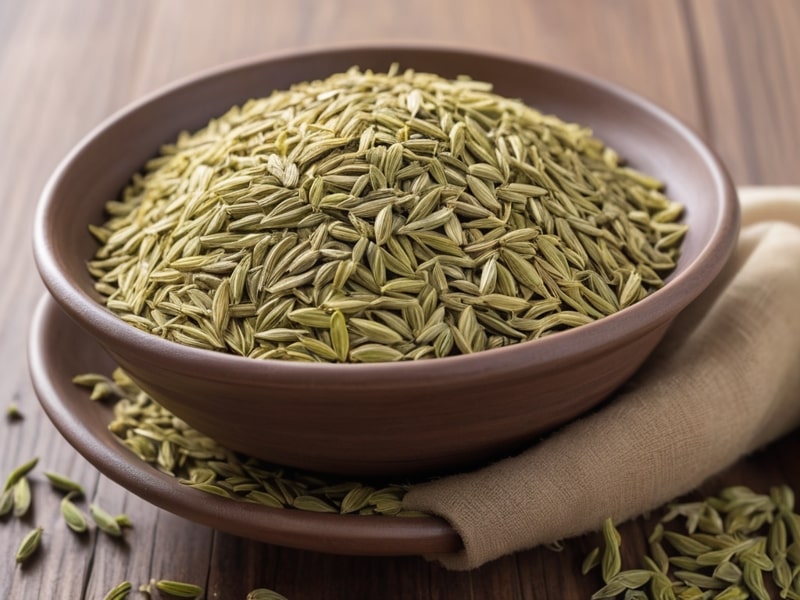

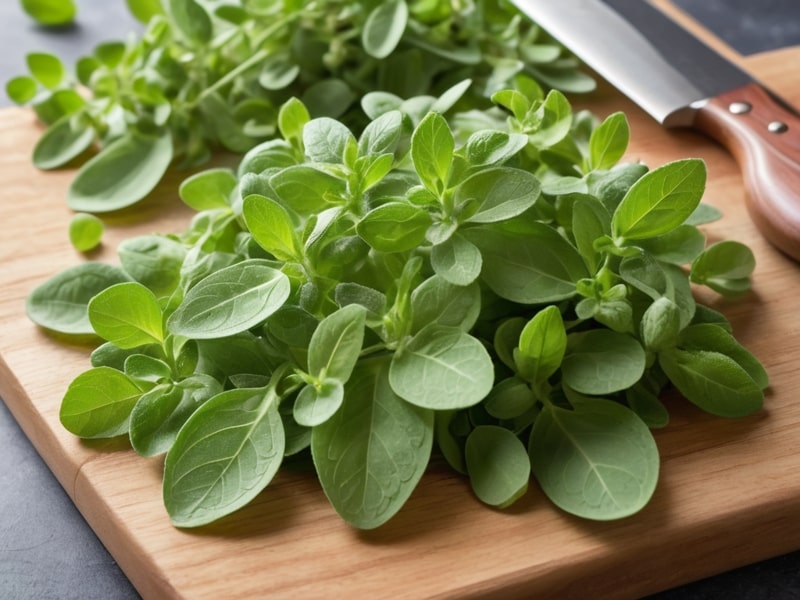
Pingback: Marjoram | Benefits, Nutrition, and Culinary Wonders